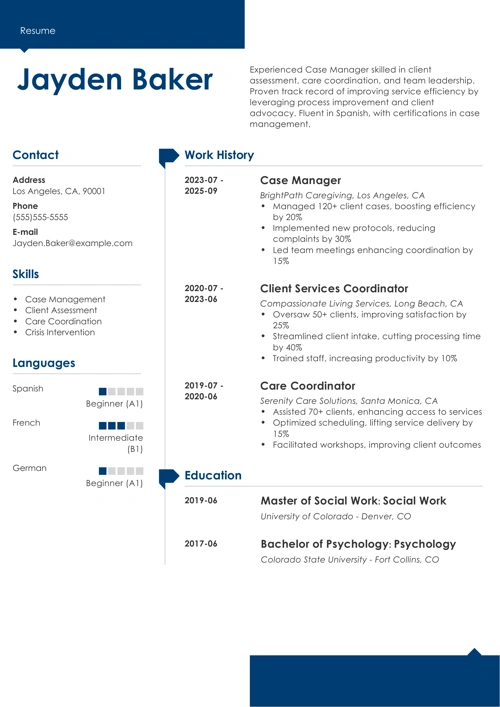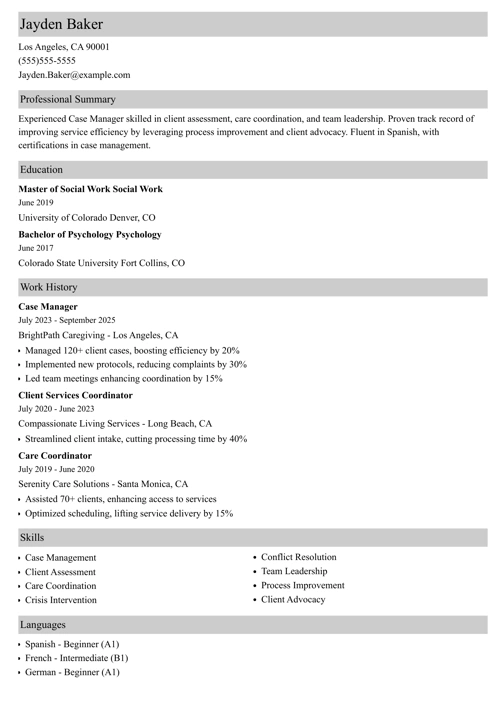A resume bio is like a magnet for the recruiter's eyes. It's placed in the upper part of your resume, and its main job is to catch and hold the hiring manager's attention.
Not sure how to write a resume bio? Check out our resume bio examples and writing tips to create a professional bio for your resume!
This guide will show you:
- What is a resume bio, and how it differs from a professional bio.
- Resume bio examples for all levels of experience.
- How to write a resume bio that will land you more interviews.
- Ready-to-use resume bio templates.
Want to save time and have your resume ready in 5 minutes? Try our resume builder. It’s fast and easy to use. Plus, you’ll get ready-made content to add with one click. Explore our free resume templates and start building your resume today.
Sample resume made with our builder—See more resume examples here.
Looking for more articles about resume writing? Check the ones below:
- Resume Summary Tips
- Resume Layout Tips
- Resume Order Tips
- Resume Outline Tips
- Resume Elements Tips
- Resume Styles Tips
- Resume Sections Tips
- Resume Structure Tips
- Best Resume Examples & Writing Guides for Every Job
What Is a Professional Bio?
A resume bio is a summary of you as a professional in a specific field of expertise. It presents your work experience, key work accomplishments, and skills. The purpose of a resume bio is to quickly acknowledge a potential employer with you as a professional.
How Is a Resume Bio Different From a Professional Bio?
Both professional bio and resume bio have similar goals of sparking an interest in you as a professional. However, while you can use a professional biography in places like social media profiles, websites, and so on, a resume bio is explicitly written for your resume.
A professional bio is usually a bit longer and written in the first person. Its goal is to create a closer bond with the reader, so it often includes personal details such as hobbies and interests. Professional bios are often used by solo entrepreneurs, freelancers, and other people who want to introduce themselves to the target audience of their potential clients.
A bio for a resume is much more concise, uses the third person, and focuses solely on the things directly related to you as a professional. It targets a professional audience of recruiters and hiring managers; hence its tone of voice is more formal than that of professional bios. In many ways, a resume bio is just another way to describe a resume profile.
Read more: How to Deal With the “Tell Me About Yourself” Interview Question?
How to Write a Resume Bio?
Just like a profile on Tinder with a compelling bio gives you higher chances for a date, a resume with a good professional bio boosts your odds for a job interview. So, how to write a work bio?
1. Start With a Dynamic Adjective
Catch the recruiter’s attention by beginning with a powerful adjective describing you as a professional. Think words like “dynamic,” “driven,” “meticulous,” and so on. A resume bio should follow a similar rule to Hitchcock’s famous words “A good film should start with an earthquake and be followed by rising tension.”
2. Pick Your Job Title
This is crucial as it’s an example of resume sections that should be tailored to the job ad. Remember to use the exact professional title the job offer mentions.
Are they looking for a “digital copywriter”? Use this exact phrasing. This way, you’ll increase your chances of passing the automatic check done by the applicant tracking software. Remember that to truly make your resume ATS-friendly, not just your resume bio but your whole resume should be tailored to the job ad.
3. Consider Mentioning Certifications
A good resume bio should highlight your industry-specific professional certifications if the job ad mentions them as one of the key requirements. This way, the hiring manager will immediately know that you’ve got the qualifications for the job.
4. Focus On Your Work Experience or Skills
A resume bio is an excellent way to describe yourself on a resume, no matter your level of work experience. If you’re a recent graduate or writing a career-change resume, focus on presenting your relevant skills and enthusiastic approach. The latter is especially important in light of the hiring for attitude tendency.
When writing a resume bio as an experienced candidate, mention your years of experience and one or two key work accomplishments. Don’t forget that focusing on your achievements and work experience doesn’t exclude highlighting your skills.
5. Show How You Can Add Value
Adapt a win-win state of mind when writing your professional bio and finish it with a sentence about how the potential employer will benefit from hiring you. Tailor it to each job ad you’re applying to by mentioning the company’s name and how you plan to contribute to its success. You should give them an answer to the “Why should we hire you” question before the hiring manager even contacts you.
Granted, a bio for a resume is focused solely on you, but you shouldn’t write it with just your needs in mind. Being self-centered, like Joffrey Lannister, never ends well.
6. Keep It Short
A good resume bio should not be longer than 3–5 sentences. You’ll easily fit all the necessary info if you stick to the most important things and cut out the fluff.
Use a job ad you’re applying for as a map of resume keywords to guide you on which specific areas to touch on. For example, if the position requires specific soft or hard skills, mention them in your resume bio.
Read more: Eye-Catching Resume Templates to Get You Noticed.
Making a resume with our builder is incredibly simple. Follow our step-by-step guide, use ready-made content tailored to your job and have a resume ready in minutes.
When you’re done, Zety’s resume builder will score your resume and our resume checker will tell you exactly how to make it better.
Resume Bio Examples
A good resume bio is like a Super Bowl ad. It’s to the point and entices you to find out more. Check out these short bio examples to gain inspiration to write your resume bio.
Resume Bio Example: Recent Graduate
Motivated pedagogy graduate with proven strong communication and organizational skills. Skilled in teamwork and focused on developing progressive pedagogy. Eager to inspire students at Adams Elementary School to achieve more and discover their full potential in a safe and supportive environment.
Resume Bio Example: Experienced Candidate
Creative social media manager with +5 years of experience in building engaged audiences for beauty brands. At Luminette, managed to grow Instagram following by 15.000 within a year and boost and contributed to a 22% increase in website traffic. Looking forward to helping Selesta increase brand awareness and social media presence by implementing my highly effective strategies.
Read more: Write a Resume That Stands Out: Examples & Tips.
Resume Bio Templates
With the fool-proof formulas below, it’s as easy as saying yes to another slice of your favorite pizza!
Resume Bio Template: Entry Level
Powerful Adjective + Profession/Job Title + Skills + Company Name + Offer
Resume Bio Template: Experienced Candidate
Powerful Adjective + Job Title + Years Of Experience + Work Achievements + Company Name + Offer
Read more: 15+ Best Minimalist Resume Templates.
Plus, a great cover letter that matches your resume will give you an advantage over other candidates. You can write it in our cover letter builder here. Here's what it may look like:
See more cover letter templates and start writing.
Key Takeaways
Now you know everything about how to write a professional bio. Let’s sum up:
- A resume bio summarizes your key characteristics as a professional. Its goal is to present you to potential employers and catch their attention quickly.
- A bio on a resume is a good option for professionals of all levels of experience, including recent graduates.
- A resume bio should include your job title, experience level, work accomplishments, skills, and professional goals.
- To write a bio for your resume, you should briefly describe yourself and make an offer on how you’ll add value to the company if hired.
About Zety’s Editorial Process
This article has been reviewed by our editorial team to make sure it follows Zety's editorial guidelines. We’re committed to sharing our expertise and giving you trustworthy career advice tailored to your needs. High-quality content is what brings over 40 million readers to our site every year. But we don't stop there. Our team conducts original research to understand the job market better, and we pride ourselves on being quoted by top universities and prime media outlets from around the world.





